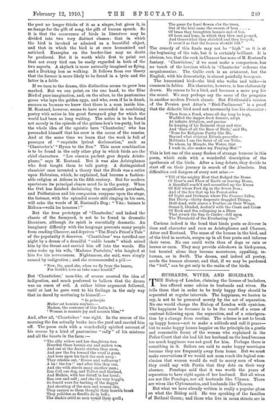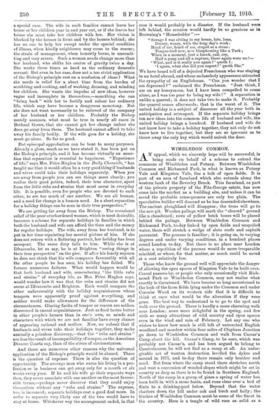HUSBANDS, WIVES, AND HOLIDAYS.
THE Bishop of London, claiming the license of bachelors, has offered some advice to husbands and wives. He tells them that in order to be truly happy they should be
separated at regular intervals. The happiness, we hasten to say, is not to be procured merely by the act of separation.
No one would charge the Bishop of London with cynicism. The happiness he foresees is to be the result of a sense of contrast following upon the separation, and of a reinvigora- tion by a change from routine. The scheme is not to break up happy homes—not to make a solitude and call it peace— but to make happy homes happier on the principle (in a gentle and reasonable form) of the woman who explained in the Police Court that she had hit her husband on the head because too much happiness was not good for him. Perhaps there is something in it. Sailors are said to make happy marriages because they are frequently away from home. But we must make reservations if we would not soon reach the logical con- clusion that women would do well to marry men of whom they could say with Portia that they dote on their very absence. Penelope said that it was worth the years of separation to have sight again of her husband. But all wives are not like Penelope, nor all husbands like Ulysses. There are wives like Clytemnestra, and husbands like Theseus.
But what we have already written is really a popular gloss on what the Bishop said. He was speaking of the families of Bethnal Green; and those who live in mean streets are in a special care. The wife in such families cannot leave her house or her children year in and year out, or if she leaves her house she must take her children with her. Her vision is blocked by the houses in front and by the houses behind; she has no one to help her except under the special condition of illness, when kindly neighbours may come to the rescue; the strain of management, when honestly borne, is unremit- ting and very severe. Such a woman needs change more than her husband, who shifts his centre of gravity twice a day. She works three times as hard as the ordinary domestic servant. But even in her case, does not a too strict application of the Bishop's principle rest on a confusion of ideas ? What she needs is relief for a short time from the burden of scrubbing and cooking, and of washing, dressing, and minding her children. She wants the impulse of new ideas, however vague and incomplete in themselves,—something she can "bring back" with her to fortify and colour her ordinary life, which may have become a dangerous monotony. But she does not want necessarily to be relieved of the company of her husband or her children. Probably the Bishop merely assumes, what mast be true in nearly all cases in Bethnal Green, that she cannot get her change unless she does go away from them. The husband cannot afford to take away his family bodily. If the wife goes for a holiday, she must go alone. So far so good.
But episcopal approbation can be bent to many purposes. Already a gloss, much as we have stated it, has been put on the Bishop's principle, and it has become virtually an asser- tion that separation is essential to happiness. "Experience of life," says Mrs. Price Hughes in the Daily Chronicle, "has taught me that it would often be a very good thing if husbands and wives could take their holidays separately. When you are away from people you can see things more clearly ; you realise their good points, indeed, their true character, apart from the little rubs and strains that must occur in everyday life. It is possible, even for people who are devoted to each other, to see too much of one another. We are all human, and a need for change is a human need. In a short separation for a holiday things can be seen in their true perspective."
We are getting far away from the Bishop. The occasional relief of the poor overburdened woman, which is most desirable, becomes a scheme for separate holidays in families in which both the husband and wife can afford the time and the money for regular holidays. The wife, away from her husband, is to put in her time repainting her mental picture of him. If she does not return with a flattering portrait, her holiday has been misspent. The same duty falls to him. While she is at Ilfracombe, let us say, he is at Brighton "seeing things in their true perspective" on the pier. If after his lonely sojourn he does not think that his wife compares favourably with all the other people he has seen, his holiday has failed. We foresee numerous failures. What would happen would be that both husband and wife, remembering "the little rubs and strains" of everyday life, as Mrs. Price Hughes says, would wonder how it was that the rubs and strains did not occur at Ilfracombe and Brighton. Each would compare the other unfavourably with the holiday acquaintances whose tempers were apparently proof against everything, and neither world make allowances for the difference of the circumstances. Glaring faults of temper or reason are seldom discovered in casual acquaintances. Just as food tastes better in other people's houses than in one's own, so minds and characters with which we are not familiar have every chance of appearing rational and mellow. Now, we submit that if husbands and wives take their holidays together, they make annually a priceless discovery,—that the " rubs and strains " are less the result of incompatibility of temper, as the American Divorce Courts say, than of the stress of circumstances.
And there are numerous other reasons wby the universal application of the Bishop's principle would be absurd. There is the question of expense. There is also the question of oppoatunity. The average man who earns his living in a pro- fession or in business can get away only for a month or six weeks every year. If he and his wife go their separate ways then, they never associate with one another on the most favour- able terms,—perhaps never discover that they could enjoy themselves without any " rubs and strains." The expense, too, is increased; separate holidays cost a good deal more. In order to separate very likely one of the two would have to stay at home. Whichever way the arrangement ended, in that
case it would probably be a disaster. If the husband were left behind, the reunion would hardly be so gracious as in Browning's " Householder ":—
" Savage I was sitting in my house, late, lone, Dreary, weary, with the long day's work: Head of me, heart of me, stupid as a stone:
Tongue-tied now, now blaspheming like a Turk; When in a moment, just a knock, call, cry,
Half a pang and all a rapture, there again were we!— 'What, and is it really you again ?' quoth I: again, what else did you expect?' quoth She."
We have heard tell of a dejected Frenchman who was staying in an hotel abroad, and whose melancholy appearance attracted the sympathy of an Englishman. "Can you wonder that I am depressed?" exclaimed the Frenchman. "Just think, I am on my honeymoon, but I have been compelled to come alone, as I was too poor to bring my wife ! " A separation is unlike a quarrel; it does not take two to make it. Probably the quarrel comes afterwards; that is the worst of it. The united holiday is a subject of discourse all the year both in anticipation and retrospect. If the separate holiday brings
ten new ideas into the common life of husband and wife, the united holiday brings a hundred. If husband and wife do not know how to take a holiday together, they not only do not know how to live together, but they are so ignorant as to throw away the only key which would unlock the door.











































 Previous page
Previous page